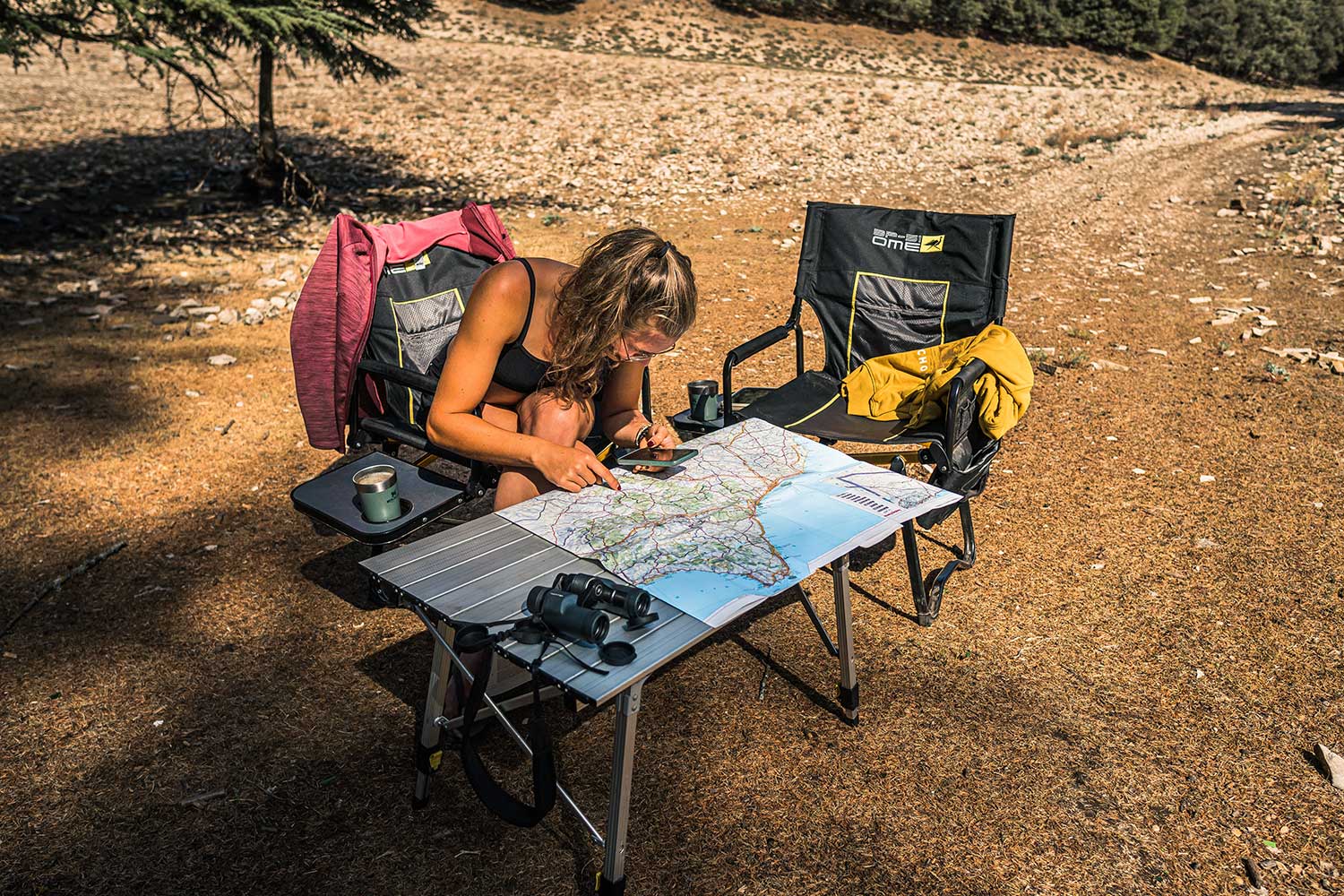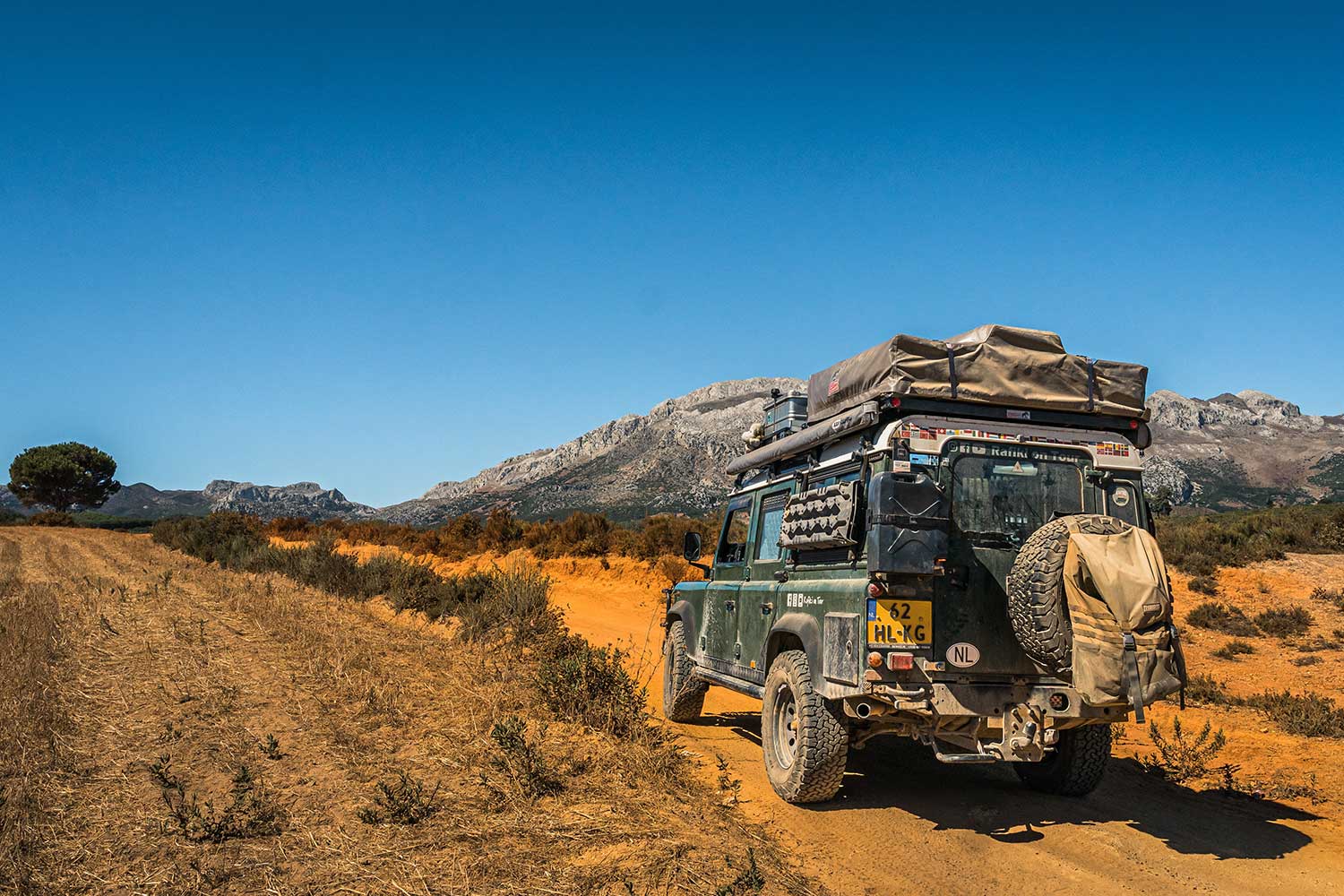With the latter in mind, we would love to provide you with some basic tips that might come in handy when leaving home. Some of the info is relevant when exploring Europe, but a lot of it comes in handy when leaving the home continent and is written with our experiences of Africa in mind.
We’ll dive into postal addresses and digitalization, paperwork and insurance, and shortly into vehicle tracking as this might influence your peace of mind when it comes to car insurance.
Text continues below photo

Postal address back home
This situation is different for everyone and is impacted by where you live, what country you come from, and the duration of your trip. You might have sold your house, sub-rented the apartment, or when you’re younger you might leave your parent’s house for a while. Depending on the laws in your home country, you might even need to de-register your residency, thus getting rid of anything admin-related back home.
According to your specific situation, you will need to make suitable arrangements. Often, having an address back home will be useful and most travelers will still have some sort of homebase to return to. Regardless of your situation and solution, it is always good to have a trustworthy parent or friend who will be able to help you out when it comes to paperwork.
This trustee could be the one receiving all your paper mail, which they are allowed to open and – if applicable – forward to you via WhatsApp. That way you’ll always stay on top of the admin stuff from home. It might be wise to switch from paper to digital updates on as many platforms as possible. This will save your trustee a lot of hassle and is better for the environment.
Paperwork that you’re able to receive digitally, or can expect in the post can be from the following:
- Phone contracts
- Insurances (house, car, health, etc.)
- Pension
- Subscriptions to magazines
- Subscriptions to organizations (automobile clubs, NGOs, etc.)
- Banking updates
Besides that, it can be very helpful to have somebody with access to your bank account. Full authorization here could prove useful when you’re robbed and everything goes sideways. The same applies to your most important paperwork. We like to have all our information on Dropbox, including copies of all our documents, and allow our parents access in case something happens.
Although it is super unlikely that something will happen to you, it is easily set up and might prove useful. Having all documents digitalized has proven to be amazing, as we’re able to access digital versions of everything, which is handy for visa applications. Setting this up back home is so much easier than when on the road, and we are happy we did.
Text continues below photo

Making the switch from Europe to Africa
One of the most asked questions we receive is; what to do with the registration and insurance of my car when leaving Europe? We will surely dive into that. But it’s also important to think about phone contracts, insurance, etc. So let’s dive into a few topics that are important to keep in mind.
Car registration and insurance
The car insurance you have in Europe, which might include an ‘All-Risk’ policy, won’t be valid in the countries ahead. The insurance Green Card from home will most likely still cover Morocco, but everything south (possibly including Western Sahara) won’t be included.
To tackle multiple unnecessary expenses right from the start most people cancel their car registration (put it on hold, you’ll keep your license plate, but you aren’t allowed to drive on public roads anymore). By doing that, you won’t need to pay for road taxes, and the mandatory MOT and vehicle insurance do not apply anymore. From that moment on your car isn’t allowed to be on public roads (in Europe) anymore. Starting then you’ll take insurance at or near the border for the countries ahead.
Unfortunately, we haven’t found an international insurance party providing ‘All Risk or Casco+ (Third Party + theft and fire)’ insurance for your vehicle in Africa. You’ll have to be satisfied with Third Party insurance, only covering the other party involved in an accident. When you start overlanding this can be quite a daunting prospect, as you will be taking your expensive vehicle to rough parts of the world, without it being covered. Soon you’ll luckily learn to live with it, as it’s all about perspective, and Africa will provide you with that.
Conclusion: cancel your car’s registration (no road taxes or MOT anymore) and cancel your insurance (you will start insuring locally).
Travel Insurance
When leaving your home country for longer periods, it is important to check your insurance. It might be smart to activate a travel insurance policy, covering your personal belongings and taking care of the bill when you suddenly need to fly home because of health reasons. Each insurance provider will have a different policy and cover a certain range of topics, it is important to do your research here, to see what fits you. Far from everybody takes on a Travel Insurance policy, but we did. We use OOM insurance to cover a range of topics, including the insurance of our electronics.
Before you depart it is also important to take care of your Health Insurance. Depending on the party responsible for it, they will most likely cover you for 3, 6, or 12 months abroad. As the length of your stay abroad might also influence the registration in your municipality, this might have an impact on your Health Insurance and pension later on as well. Check with your municipality what to do when starting a long-term trip, and check in with your Health Insurance to see what the maximum continuous period abroad is. You might want to do this before taking on Travel Insurance, as some can provide you with added Health Insurance as well.
Phone contract
Your phone contract from Europe is valid in all EU countries. But as soon as you start traveling further south it becomes very expensive to keep using your current contract/bundle. From then on it makes more sense to buy sim cards in every country you visit, buying prepaid internet packages as you go. This will cost you about € 1-1,5 per GB on average. However, in South Africa, we paid only € 20,- for 200GB (MTC Super Data)
It might be a smart move to cancel your current contract and switch to a prepaid SIM card (with number retention). That way you don’t have to worry about unnecessary costs. It is important to make this switch when you’re still at home. We made the mistake of not doing so. Turns out the switch from a contract to a prepaid bundle required a new SIM card, which had to be activated in the home country. We brought our new prepaid card along, to start the switch once we reached Africa. By not using it in The Netherlands first, we rendered it partially useless due to the lack of activation in The Netherlands (with this new prepaid Vodafone sim card we can receive texts, but not text ourselves or call at all).
So switch to prepaid to prevent unnecessary costs, but do it whilst you are still back home to prevent troubles. Or double-check, and re-check with your provider to see if different rules apply. Vodafone NL tried to help us out (with dozens of e-mails), but it wasn’t technically possible to solve our problem.
GPS tracker
Shortly coming back to the fact that your car won’t be fully insured whilst traveling through Africa, we have some advice. As we couldn’t find an insurance provider covering us fully, we had to keep our heads cool and tried to come up with solutions. The most pressing matters were fire and theft. As your vehicle is probably well equipped with a large electrical setup, and the engine of your truck might have quite some kilometers under the belt already, this might be a reason to worry about fire. Fire is something to take seriously, but by taking your electrical setup just as seriously and making sure your engine isn’t leaking oil you can mitigate the fire risk. Make sure to really set everything up securely and check things regularly. The vibrations on the road can wreak havoc on your setup and initiate a fire if left unattended.
The risk of theft can be extremely worrisome. Luckily we can now confidently say we don’t worry too much anymore. People don’t tend to steal cars, and you’ll be with your vehicle most of the time. Installing an immobilizer and better locks will mitigate most of the risks involved.
As an extra precaution or an addition to peace of mind, you can install the Garmin InReach Mini with the ‘Recreation’ subscription plan. This setup allows you to send the device’s location every ten minutes. We installed the device into Rafiki and can now constantly track the car’s movements. It surely provides peace of mind, and besides that, it is also nice that we now have access to unlimited Check-In messages and 40 custom messages a month, and of course its SOS function. Most travelers we met have brought this device along, so why not upgrade to a slightly bigger plan and install it in the vehicle to make the most of its functions?
Text continues below photo

Conclusion
The information above is compiled according to our experiences before setting off on our Africa expedition. We covered a few basics, but surely not everything. As every situation, depending on your life back home and your home country’s rules, is different, it is important to map out what you need to tackle.
Of course, there is also all the paperwork for on the road that needs to be taken care of. Therefore we also wrote a blog about this, covering essential paperwork with some handy advice.
Feel free to contact us if you have any questions regarding the above, we are happy to help you out.



0 Comments